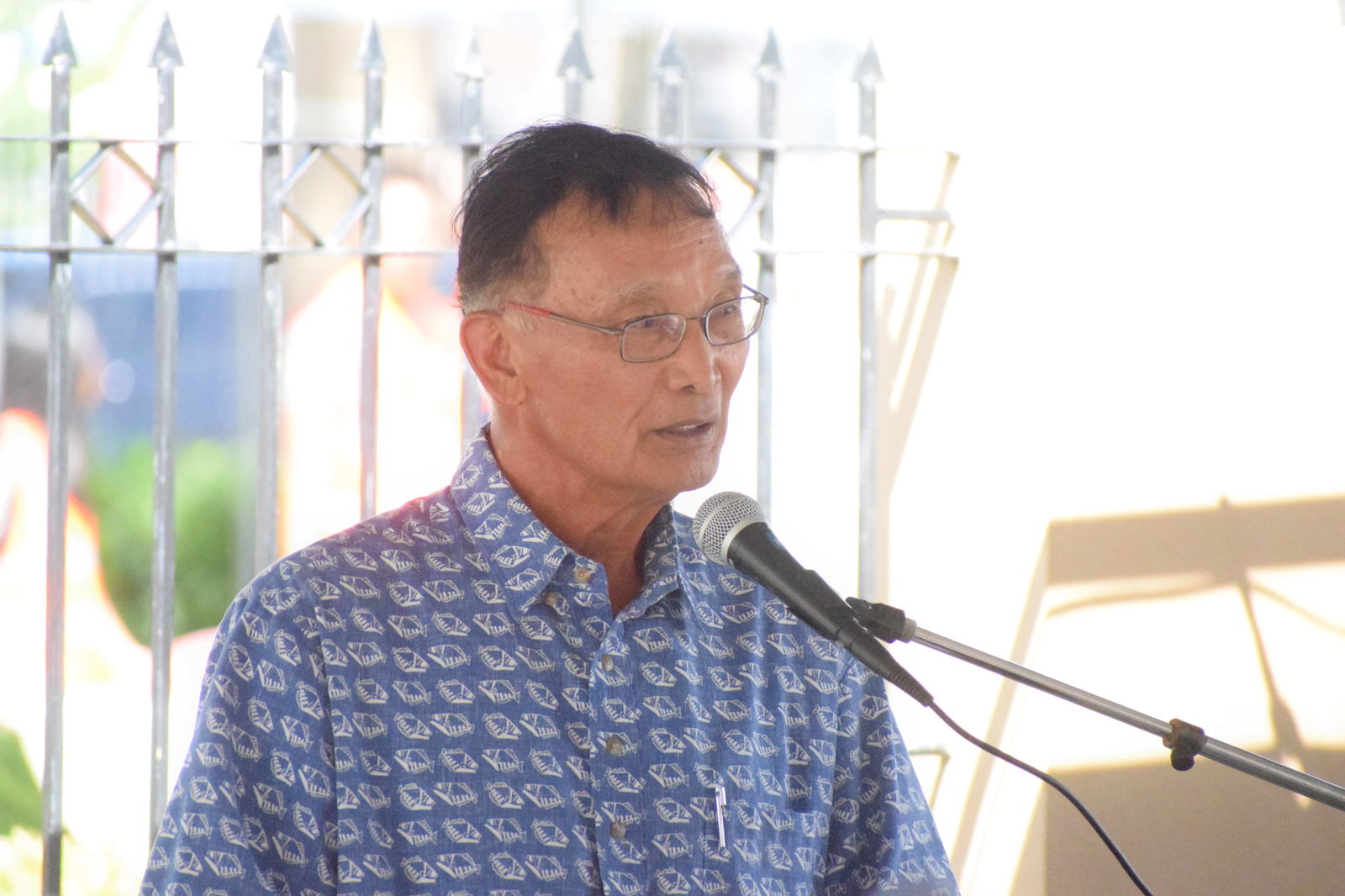
Former Gov. Juan N. Babauta speaks during the 16th commemoration ceremony of the Chalan Kanoa Leadership Memorial Kiosku Courtyard on Friday, March 14, 2025.
FORMER Gov. Juan N. Babauta said the CNMI should pursue statehood and “first-class citizenship.”
In his remarks on Friday during the 16th commemoration ceremony for the Leadership Memorial Kiosku in Chalan Kanoa, he said: “Let the next 40 years of leaders pick up where [previous leaders] left off and take on the task remaining: get rid of territorial status. Stop insular area status. Pursue first-class in lieu of second-class [citizenship]. And since there is no turning back, the only path forward is [to] pursue full membership in the American political family through statehood.”
The Kiosku memorializes the leaders of Saipan and the Northern Islands from the post-war era to the present Commonwealth era.
Babauta said the local people of the CNMI harbor “the uncomfortable feeling [of] second-class U.S. citizens” who are not allowed to vote for U.S. president.
He noted that the CNMI is “under the general administrative provision of the Department of the Interior by virtue of a proclamation and order by President Reagan.”
He said the CNMI “turns the other cheek” whenever Washington refers to these islands as a territory while local residents “vigorously argue” that “we should be called a Commonwealth.”
Babauta, who also served as Washington representative from 1990 to 2002, said even though the “formula matrix” of the U.S. government takes into account population size, income, poverty levels, and more, only a “trickle” of federal funds are provided to the CNMI.
He said the CNMI “gave up” its 702 funds to its own “detriment” and that 902 talks with the federal government have “no teeth.”
He said whenever federal issues “don’t go our way,” the CNMI “rationalizes” it by pointing out that “we have no vote in Congress.” He described this as a “fallback” argument.
Babauta said the founding fathers of the CNMI envisioned that improved political status as a Commonwealth would eventually “serve as a catalyst to improve the [local people’s] social and economic well-being [and] education, [resulting in] a new way of life and a more promising future for the people of the [islands] that is self-governing under the sovereignty of the United States of America.”
He believes statehood to be the logical progression of the CNMI’s political journey.
“If we’re happy with where we are today — we, meaning the people of the CNMI [and] other territories, like Guam, the U.S. Virgin Islands and American Samoa — if they’re happy with where they are, then so be it. If they’re not, then we need to step it up a notch and do something about it,” Babauta told Variety in an interview.
When asked about other political statuses such as free association or independence, Babauta said he did not believe the U.S. would agree to either.
According to Section 105 of the Covenant, certain “fundamental” provisions can only be modified with the joint consent of the United States and Commonwealth governments.
“In the Covenant, there’s mutual consent,” Babauta said. “Let’s say, for the sake of discussion, that we want independence. I don’t think the U.S. will…relinquish us because [we are] very valuable out here as partners in the American political family.”
He said statehood, which requires U.S. congressional approval, is the status both parties would be more likely to agree on.
“If we want to enhance our status, I feel that the U.S. will agree to something like that. We are more apt to take our political status up a notch rather than change direction,” he said.
In a bid for statehood, he said the CNMI would need to merge with Guam, and, “ideally,” with the other U.S. affiliated islands in Micronesia.
“This is something that is not new. Back in 1963 President John F. Kennedy called for statehood of the entire Micronesia area, so this is not something that I thought about out of thin air,” Babauta said. “Had President Kennedy lived, I think we would have achieved statehood during his presidency.”
Babauta said the CNMI could become a state faster than Puerto Rico.
“If you look at [Puerto Rico], it seems they’re not really sure what they want. More than half want statehood, but others want free association or independence. For us, I think the path we should take will allow us to continue toward statehood and move forward.”











